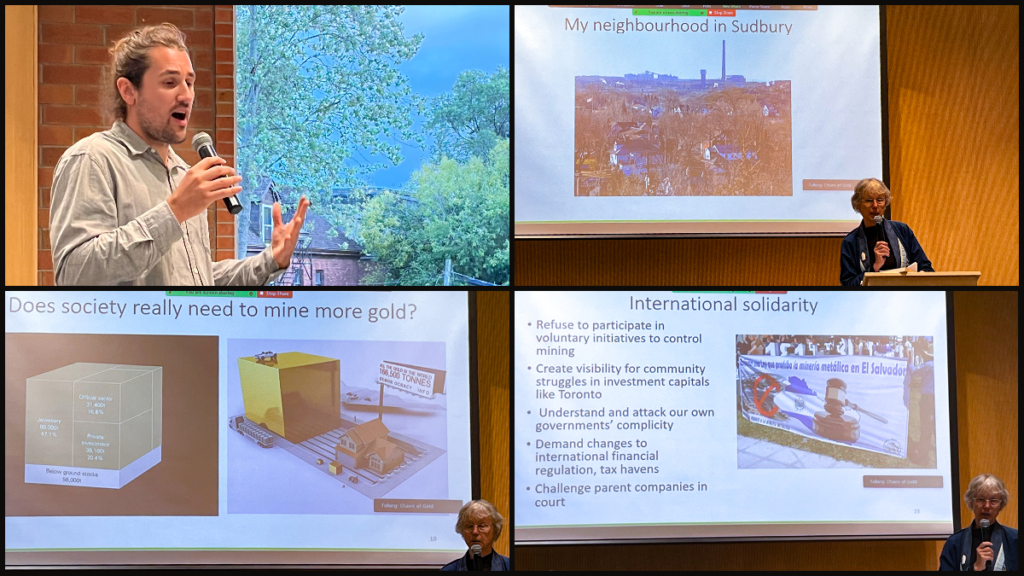By Kiegan Irish, Animator for Eastern and Northern Ontario


In capitulating to mining industry interests, the Canadian state is complicit in gross abuses of the land and environmental rights of Indigenous and impoverished communities across the Americas. That was the stark takeaway of an event I cohosted for Development and Peace ― Caritas Canada on September 22 at the Kingston Frontenac Public Library in Kingston, Ont.
Over 50 people from across Canada attended Chains of Gold: Extraction, Repression, and Solidarity in Canada and Latin America, a trilingual webinar (English, French and Spanish) co-organized with the Providence Centre for Peace, Justice and Integrity of Creation.
The panelists were Donald Hernández, a human rights lawyer who directs CEHPRODEC, one of our partner organizations in Honduras and Joan Kuyek, a noted activist and the author of Unearthing Justice: How to Protect Your Community from the Mining Industry. Their presentations underscored the importance of our People and Planet First campaign and the connections between our advocacy work in Canada and our partners’ work in the Global South.
Defending the defenders
Hernández gave an overview of the accompaniment and legal aid that CEHPRODEC provides to land defenders standing up to the extractive industry. This work is critical in Honduras, one of the world’s most dangerous countries for land and environmental defenders.
Hernández explained that because poor rural communities lack the time and resources to acquire expertise in complex mining and property law and international trade frameworks, CEHPRODEC also educates them about these issues and their rights and legal protections.
He said that although much hope is vested in the new Honduran government’s progressive election manifesto, the repression of land defenders continues, and legal structures remain disadvantageous to Indigenous communities. Hernández recalled the criminalization and persecution of Víctor Vásquez and Sonia Pérez, whose cases Development and Peace has highlighted.
Hernández decried the jarring disproportion between the tiny quantities of minerals extracted and the enormous amount of waste and destruction by the mining industry. He lamented the incalculable social and ecological harm inflicted by unscrupulous mining companies, many of which are Canadian. Asked by an audience member what Hondurans thought of Canada, Hernández replied, “For those whose lands are stolen and poisoned by mining companies, Canada is synonymous with mining!”
Indefensible ideologies
Kuyek elaborated on Hernández’s discussion of the logic and logistics of mining. Examining its ideological foundations, she noted that the mining industry describes everything besides the ore it covets as “overburden.” In this worldview, rock, soil, plants, animals and whole ecosystems are waste products.
Mining profits are short-term benefits derived by externalizing profound harms onto communities, miners and the environment, Kuyek explained. She described how the mining industry expertly exercises control over governments and policymaking through lobbying, financial incentivization and crafty mythmaking. It portrays itself as completely necessary to modern life, jobs, green technology, progress and development. The Canadian state enthusiastically reproduces these myths, Kuyek said.
Activists organizing to oppose mining must seize the narrative, Kuyek urged. We must ask hard questions. Are there not more just, more sustainable ways to meet our needs? Once the real costs of mining are considered, does it really constitute development?
How we can build a better future
Hernández and Kuyek made the case for us in the new imperial core of the wealthy West to organize against abusive extractive projects, in solidarity with their victims. This is in line with Development and Peace’s mission of pursuing “alternatives to unjust social, political, and economic systems.”
To dismantle what Kuyek has called “the power structures in Europe and North America,” we need to transform Canadian society to reflect a vision of justice and peace; to not purchase our comforts at the expense of the poor and the Earth; and to ensure that our desired energy transition for a liveable climate does not depend on the voracity and craven destructiveness of the mining industry.
You can do your part by signing and sharing our campaign petition for mandatory human rights and environmental due diligence laws to prevent and redress Canadian corporations’ overseas abuses of human rights and the environment. You can also meet your Member of Parliament to apply pressure to act. Contact your local animator to discover other ways of supporting our movement. Please also consider making a donation to support the frontline work of organizations like CEHPRODEC.

